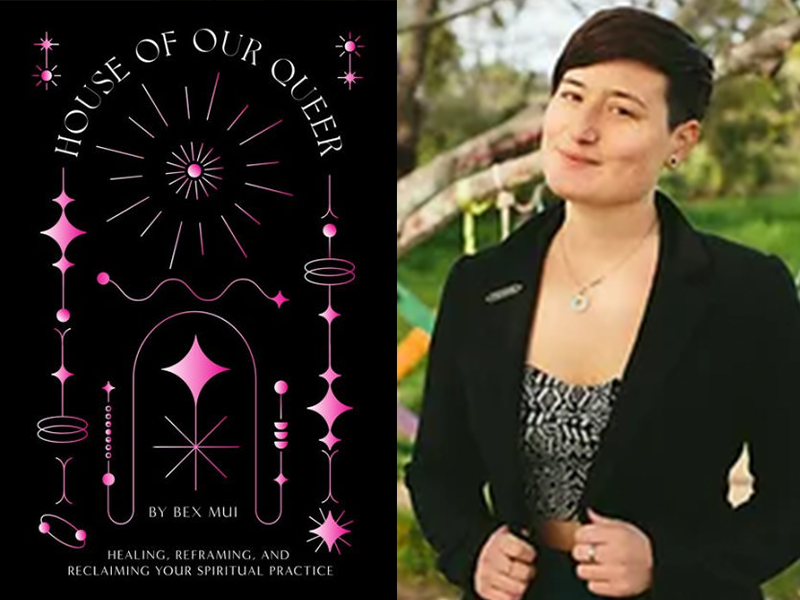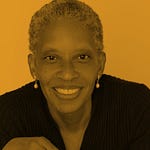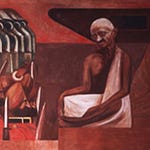When Goddess Erica and her husband opened up their marriage, she already knew how she deserved to be treated. “I don't want to say that [my husband] gave me the standards, but he helped me get to a point where I realized that my low bar is worship,” she explained in our interview.
But this realization wasn’t the only thing that led to Erica claiming her Goddess title. Becoming a mom was also a big part of the journey:
“I gave up my body and was willing to give up my personhood for my son. I chose to be an entity that would do anything for this kid. And then you take just a half step further and you're like, I'm willing to do anything for them — I'm willing to do anything for myself. And if that's not God, then what is?”
To Goddess Erica, claiming divinity has everything to do with a fierce and radical self-love: being willing to do anything for yourself.
Now she’s on a mission to change the world by helping others recognize their own divinity. She runs a mission-based agency that works with businesses and individuals to provide everything from marketing support to doula services. You can learn more at YesGoddessErica.com.
On the podcast, she talks about growing up as the granddaughter of a Southern Baptist minister, and the impact of having a child and opening up her marriage. We also explore the dynamics involved in goddess worship, how to live an orgasmic life and consider an orgasmic death.
What follows are highlights from our conversation about what it means to claim divinity.
1. Claiming your divinity doesn’t mean seeing others as less
For Goddess Erica, claiming goddess status is an act of defiance against societal hierarchies that pit people against each other. But it’s also a way of breaking down the false barrier between us and the divine.
“When I call myself a goddess, it is in recognition of the fact that I am part of the universe experiencing itself and that every single living thing on this planet and the universe is part of the universe. It's just a portion of the divine experiencing in itself. And when I say that I am a goddess, I'm actually recognizing the divinity in you.”
This reminds me so much of the golden rule. The basic idea that we have to truly love ourselves in order to love others. If we’re not able to recognize the divine in ourselves, how can we be expected to recognize it in others?
2. Claiming divinity means believing in yourself
Goddess Erica has been through a number of coaching programs, and the biggest benefit were all the moments she learned that someone believed she was “capable of doing that hard thing.”
“Imagine if we were able to do that to ourselves; imagine believing in ourselves entirely,” she explained. “That's what it means to embody your divinity: there's nothing I can't or won't do for myself. I am the answer to all of my prayers.”
As someone who continues to struggle with what “faith” means to me, one of the hardest things to accept — and what I keep coming back to over and over again — is the deep need for faith in myself. I was taught to search for answers in a higher power (and I still believe that we are not alone.) But what if the foundation of faith is faith in self? How radically would that change my life? Your life?
3. Claiming divinity is seeing worship as a low bar in your relationships.
Okay so we didn’t really get into what this means, so here’s my take. If you recognize yourself as part of the divine; if, like Goddess Erica, you look yourself in the eye and tell yourself on a regular basis there’s nothing you wouldn’t do for yourself — you won’t put up with people in your life who don’t treat you well.
Worship doesn’t need to mean inequality. Worship can mean a commitment to mutual service – because if you recognize the divinity in your partners, you’re worshipping the divine by caring for them, as well. In this way, worship means being in awe of each other. And in case you need to hear this: you deserve it.
About Goddess Erica
Goddess Erica is an Orgasmic Doula, specializing in personal empowerment and pleasure- centered childbirth. With a mission of normalizing kink, gender identity, polyamory and radical self-love, her creative services agency offers group workshops, individual coaching and marketing support for sex-positive businesses. To find more information on her body of work and service offerings visit www.YesGoddessErica.com
Radical Soul Book Club
Next up in the book club, House Of Our Queer: Healing, Reframing, and Reclaiming Your Spiritual Practice by spiritual activist Bex Mui.
We’ll be discussing the book on Monday, March 25 5pm PT/8pm ET.
Want to read ahead? See the full 2024 book club calendar.
This newsletter is free for everyone. Want to support? Buy me a coffee via Venmo or PayPal.
















Share this post